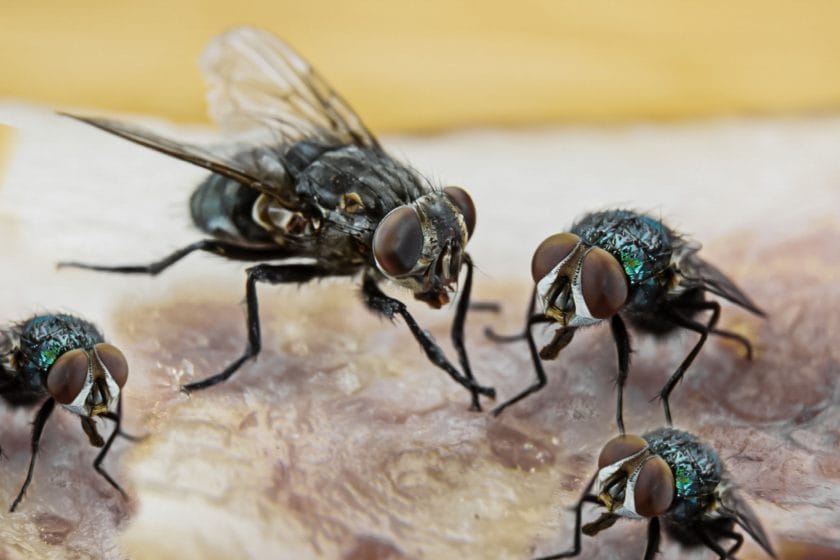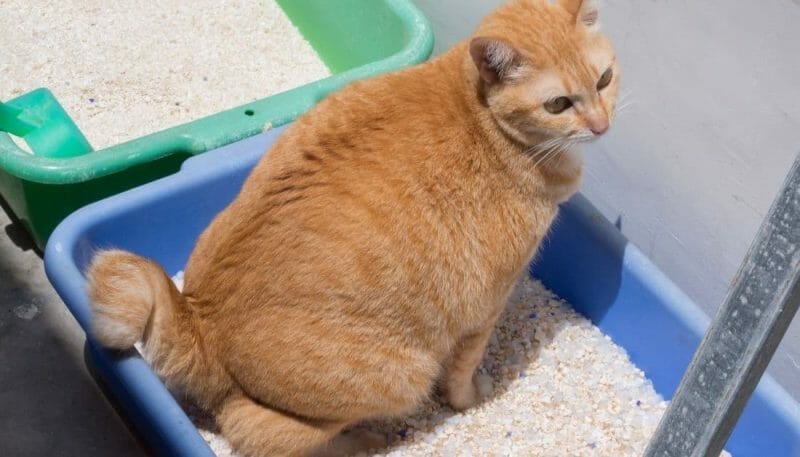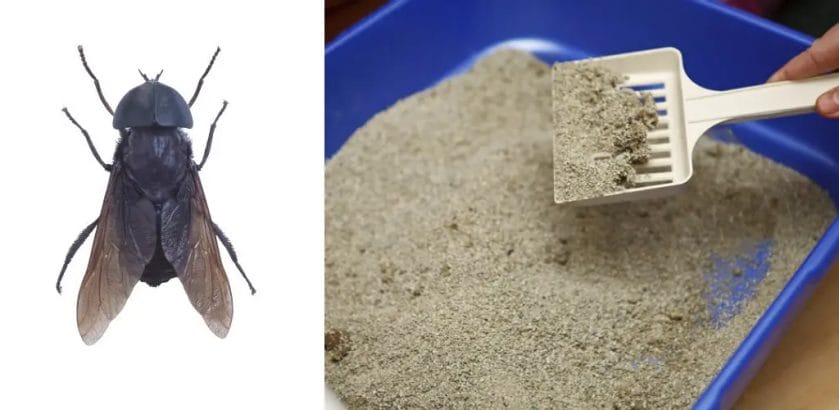If you’re tired of dealing with pesky flies buzzing around your cat’s litter box, we have some tips to help you get rid of them for good.
Flies are naturally attracted to the scent of cat waste, making the litter box an ideal breeding ground for them. To combat this problem, start by regularly cleaning the litter box to remove any waste or debris that may attract flies.
Additionally, consider using a litter box with a lid or cover to create a barrier between the waste and the flies. This can help prevent the flies from accessing the litter box and laying eggs.
Another effective way to deter flies is to use natural repellents. Try placing a few sachets of dried lavender or mint leaves near the litter box to repel flies with their strong scent.
Finally, make sure to maintain cleanliness in the surrounding area. Keep garbage cans tightly sealed and dispose of any food waste properly, as this can also attract flies.
Read on to learn the process in detail.

Effective Cleaning Techniques for Fly-Free Cat Litter
Flies can not only be annoying, but they can also pose a health risk for you and your cat. To help you maintain a fly-free litter box, we have compiled some effective cleaning techniques that you can implement.
1. Scoop the litter box regularly
The first step to preventing flies from being attracted to your cat’s litter box is to scoop it regularly.
Remove solid waste and clumps of urine-soaked litter on a daily basis. Flies are attracted to the odor of waste, so by removing it promptly, you can reduce the chances of flies being attracted to the area.
2. Use an odor-neutralizing litter
Choosing the right type of litter can make a significant difference in keeping flies away. Opt for an odor-neutralizing litter that helps to control the smell of waste.
A litter with activated charcoal or baking soda can help absorb odors and deter flies from being drawn to the litter box.
3. Clean the litter box with mild detergent
Periodically, you should give the litter box a thorough cleaning to ensure it remains fly-free.
Use a mild detergent and warm water to clean the box, removing any lingering odors that may attract flies. Avoid using harsh chemicals, as they can be harmful to your cat’s health.

4. Dry the litter box thoroughly
After cleaning the litter box, make sure it is completely dry before adding fresh litter. Flies are attracted to moist environments, so keeping the litter box dry can help deter them from being attracted to it.
5. Place the litter box in a well-ventilated area
Proper ventilation can also play a role in preventing flies from being attracted to your cat’s litter box.
Ensure that the litter box is placed in a well-ventilated area with good airflow. This will help to reduce any lingering odors and discourage flies from congregating around it.
6. Use fly repellents
If you’re still experiencing issues with flies being attracted to the litter box, you can consider using fly repellents.
There are various natural repellents available, such as essential oils or herbs like lavender or mint, that can be placed near the litter box to deter flies.
7. Empty and clean the litter box regularly
In addition to scooping the litter daily, it’s important to empty and clean the litter box completely on a regular basis.
Depending on the type of litter you use, this may range from weekly to monthly. By thoroughly cleaning the litter box, you can eliminate any lingering odors that may attract flies.
8. Keep the surrounding area clean
Flies are not only attracted to the litter box itself but also to the area surrounding it.
Ensure that the surrounding area is clean and free from any spills or waste that may draw flies. Regularly sweep or vacuum the area to prevent any buildup of debris.

9. Consider covered litter boxes
If flies continue to be a persistent problem, you may want to consider using a covered litter box. Covered litter boxes help contain odors and prevent flies from being attracted to the area.
However, it’s important to note that some cats may not feel comfortable using a covered litter box, so monitor your cat’s behavior and adjust accordingly.
10. Consult with your vet
If you have tried various cleaning techniques and still can’t seem to combat the fly problem, it may be worth consulting with your veterinarian. They can provide further guidance and recommend additional solutions to keep your cat’s litter box fly-free.
Keeping your cat’s litter box clean and fly-free is essential for both your cat’s well-being and your own. By implementing these effective cleaning techniques, such as regular scooping, using odor-neutralizing litter, and keeping the litter box and surrounding area clean, you can prevent flies from being attracted to the litter box. Remember to consult with your veterinarian if you encounter persistent fly issues despite your best efforts.
Proper Litter Box Placement to Reduce Flies
By implementing proper litter box placement, you can help deter flies from infesting the area. In this section, we will explore the importance of proper litter box placement and how it can be effective in reducing flies.
1. Keep the Litter Box Away from Food and Water Sources
Flies are attracted to sources of food and water. To prevent them from being lured to your cat’s litter box, it is crucial to keep it away from their feeding and drinking areas.
Ensure that the litter box is placed in a separate location, preferably in a quiet and secluded spot where your cat feels comfortable.
2. Choose a Well-Ventilated Area
Proper airflow is essential to control the presence of flies around the litter box. Select a well-ventilated area for the litter box, allowing fresh air to circulate and reducing the chances of flies being attracted to the odor.
Avoid placing the litter box in a confined space or near closed windows or doors that can limit proper ventilation.
3. Consider Natural Light
Natural light can help deter flies as they are attracted to darker areas. When choosing the location for the litter box, opt for a well-lit area that receives ample natural light.
This will not only make it less appealing for flies but also create a more inviting environment for your cat.
4. Regular Cleaning and Maintenance
Keeping the litter box clean and well-maintained is crucial in preventing fly infestations. Flies are attracted to the odor and waste in the litter box, so it is essential to scoop the litter box daily and replace the litter regularly.
By maintaining cleanliness, you can eliminate the attractants for flies and create a less desirable breeding ground.
5. Use Fly Deterrents
In addition to proper placement, you can also use fly deterrents to further reduce the presence of flies around the litter box.
Consider placing fly repellent herbs, such as lavender or mint, near the litter box. The strong scent of these herbs can help repel flies and keep them at bay.
6. Seek Professional Pest Control Help
If you have tried various methods and still struggle with fly infestations around the litter box, it may be time to seek professional pest control help.
A pest control expert can assess the situation and provide effective solutions to eliminate flies and prevent them from coming back.
Proper litter box placement plays a significant role in reducing flies around your cat’s litter box. By keeping the litter box away from food and water sources, choosing a well-ventilated area with natural light, regular cleaning and maintenance, using fly deterrents, and seeking professional pest control help if needed, you can create a fly-free environment for your cat and yourself. Implement these tips to keep your home free from flies and ensure a clean and comfortable space for your feline companion.
Cat-Friendly Fly Traps and Repellents
When it comes to maintaining a clean and healthy environment for your feline friend, keeping flies away from their litter box is essential. Flies can not only be annoying to both you and your cat, but they can also pose a potential threat to their health. Fortunately, there are several cat-friendly fly traps and repellents available on the market that can help you keep those pesky flies at bay.
1. Fly Traps:
One effective way to eliminate flies around your cat’s litter box is by using fly traps. These traps are specifically designed to attract and catch flies without harming your cat. They come in various forms, including sticky traps, electric traps, and bait traps.
Sticky Traps: Sticky traps are adhesive sheets that are coated with a sticky substance. They can be hung near the litter box or placed on the floor. Flies are naturally attracted to the sticky surface and get stuck when they land on it. Make sure to choose a sticky trap that is safe for your cat, as some adhesives can be harmful if ingested.
Electric Traps: Electric fly traps use UV light to attract flies. When the flies come in contact with the electric grid, they are instantly zapped. These traps are safe for cats as they have protective grids that prevent your furry friend from coming into contact with the electric components.
Bait Traps: Bait traps use a combination of attractants, such as food or pheromones, to lure flies into a trap. Once they enter the trap, they are unable to escape. Look for bait traps that are specifically designed for indoor use and are safe for cats.
2. Fly Repellents:
In addition to fly traps, there are also cat-friendly fly repellents that can help deter flies from your cat’s litter box area. These repellents work by emitting scents that flies find unpleasant, keeping them away from the vicinity.
Natural Repellents: Natural fly repellents often contain essential oils, such as citronella, eucalyptus, or lavender, which flies dislike. These repellents come in various forms, including sprays, diffusers, or scented candles. Ensure that the products you choose are safe for cats and follow the instructions for proper usage.
Ultrasonic Repellents: Ultrasonic repellents emit high-frequency sound waves that are inaudible to humans but irritating to flies. These devices create a fly-free zone around the litter box area by deterring flies from entering. Look for ultrasonic repellents that are designed to be pet-friendly and safe for cats.
In summary, keeping flies away from your cat’s litter box is crucial for maintaining a clean and comfortable environment. Choose cat-friendly fly traps, such as sticky traps, electric traps, or bait traps, to catch and eliminate flies without harming your cat. Consider using natural repellents or ultrasonic repellents to deter flies from the litter box area. Always prioritize the safety and well-being of your feline companion when selecting products.
1. How can I get rid of flies in my cat litter?
To get rid of flies in your cat litter, make sure to keep it clean and odor-free by scooping it daily. Additionally, use a covered litter box or invest in a litter box with a built-in fly repellent. Regularly empty and clean the litter box to prevent flies from being attracted to it.
2. What can I do to prevent flies from infesting my cat litter?
To prevent flies from infesting your cat litter, consider using a litter box with a tight-fitting lid or a self-cleaning litter box. Make sure to dispose of soiled litter in a sealed bag and store it in a closed trash can. Keeping your home clean and free from food debris can also help deter flies.
3. Are there any natural remedies to repel flies from cat litter?
Yes, there are natural remedies you can use to repel flies from your cat litter. Sprinkling diatomaceous earth or a mixture of vinegar and water around the litter box can help deter flies. You can also try using essential oils like lavender, peppermint, or eucalyptus by adding a few drops to the litter or placing a soaked cotton ball near the litter box.

